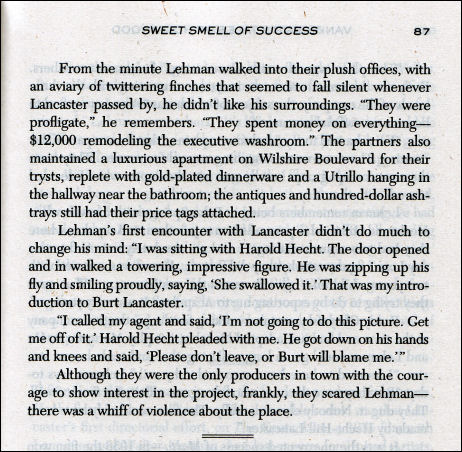Posted on 3.1.19: Earlier this month I posted two thumbnail assessments of the careers of Tony Curtis and William Holden. They both enjoyed relatively brief hot-streak periods. Holden’s lasted six or seven years, or between Stalag ’17 (’53) and The Horse Soldiers (’59). Curtis’s fortunate-son period ran 11 or 12 years, or between Sweet Smell of Success (’57) and The Boston Strangler (’68).
As noted, Holden kept plugging until his death in ’81, but from The Horse Soldiers on (or over the next 22 years) Holden only made six genuinely good films — The Wild Bunch, Wild Rovers, Breezy, Network, Fedora and S.O.B. Curtis had no luck at all after The Boston Strangler.
Burt Lancaster‘s career was different in that he was always a long player. His commercial hot streak of the late ’40s to mid ’50s (westerns or action-swashbuckler films mixed with two or three dramas) happened between his late 30s and mid 40s, but except for his 1950s peak achievement of From Here To Eternity (i.e., Sgt. Milt Warden) along with The Rose Tattoo and The Rainmaker, he was more into commercial bounties.
Then came a prestige-drama-mixed-with-action period — 12 or so years, 1957 to 1969, between his mid 40s and mid 50s — that turned into Lancaster’s greatest run. Oh, the glories of Sweet Smell of Success, Run Silent, Run Deep, Separate Tables, The Devil’s Disciple, The Unforgiven, Elmer Gantry, The Young Savages, Judgment at Nuremberg, Birdman of Alcatraz, A Child Is Waiting, The Leopard, Seven Days in May, The Train, The Hallelujah Trail, The Professionals, The Swimmer, Castle Keep and The Gypsy Moths.
In the ’70s Lancaster, entering his 60s, downshifted into mostly genre-level, mezzo-mezzo films — seemingly a getting-older, wind-down cycle. The highlights were Robert Aldrich‘s Ulzana’s Raid, Luchino Visconti‘s Conversation Piece and Bernardo Bertolucci‘s 1900.
Then came the ’80s and a resurgence with three great performances in three commendable films — aging wise guy and Lothario Lou Pascal in Louis Malle‘s Atlantic City (‘80), oil tycoon Felix Happer in Local Hero (’82) and the kindly Moonlight Graham in Field of Dreams (’89).
Lancaster was not a great actor, but he was a graceful and commanding alpha-male presence, and he had a great sense of style, and he knew how to sell it. What was his greatest performance? I’m torn between From Here To Eternity, Elmer Gantry, The Swimmer and Atlantic City (“Boy, that was some ocean”).
Wiki excerpt: Lancaster appeared in a total of 17 films produced by his agent Harold Hecht. Eight of these were co-produced by James Hill. He also appeared in eight films produced by Hal B. Wallis and two with producer Mark Hellinger. John Frankenheimer directed five films with Lancaster: The Young Savages (1961), Birdman of Alcatraz (1962), Seven Days in May (1964), The Train (1964), and The Gypsy Moths (1969).
He was directed four times by Robert Aldrich, three times by Robert Siodmak and Sydney Pollack, and twice by Byron Haskin, Daniel Mann, John Sturges, John Huston, Richard Brooks, Alexander Mackendrick, Luchino Visconti and Michael Winner.
Every three or four years I’ll mention this scene from Ted Post‘s Go Tell The Spartans (’78). Easily one of the best monologues Burt Lancaster ever delivered in his 43-year career, and certainly the most memorable scene in this low-budget Vietnam drama, which was one of the Vietnam wave of films that came out that year (Coming Home, Rolling Thunder, The Boys From Company C).
Posted on 9.13.14: If you’re a real movie star like Burt Lancaster was when he made Elmer Gantry, you can sell this scene. But you need a certain largeness of spirit and stand-up confidence. Who could do this scene today if Gantry were to be remade? Who could generate at least a semblance of this planted, here-I-am energy? Chris Evans? Chris Hemsworth? Give me a name.
Posted on 2.12.09: A couple of days ago I picked up a copy of Graydon Carter ‘s Vanity Fair’s Tales of Hollywood: Rebels, Reds, and Graduates and the Wild Stories Behind the Making of 13 Iconic Films (Penguin), an anthology deal that came out two months ago. It includes Sam Kashner‘s account of the making of Sweet Smell of Success, which first appeared in an April 2000 issue. And when I got to page 87, I nearly collapsed.

The above excerpt makes it unnecessary to summarize or describe except to say that the anecdote came from the late Ernest Lehman, who shared screenplay credit with Clifford Odets.
This is not an endorsement of Burt Lancaster‘s indicated behavior or attitudes about women. The guy was obviously a bit of a pig in this regard. But there’s something hilarious about a man of great force and accomplishment — an actor-producer with a rep that everyone respects and admires — sounding like an asinine 15 year-old, an unregenerate lout. I can imagine him beaming as he said this, the same way he turned it on time and again for the cameras. I suppose that the humor comes from being reminded that actors really are children deep down.









